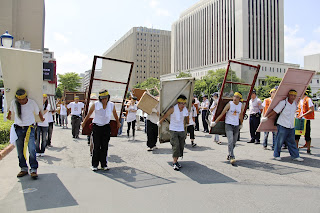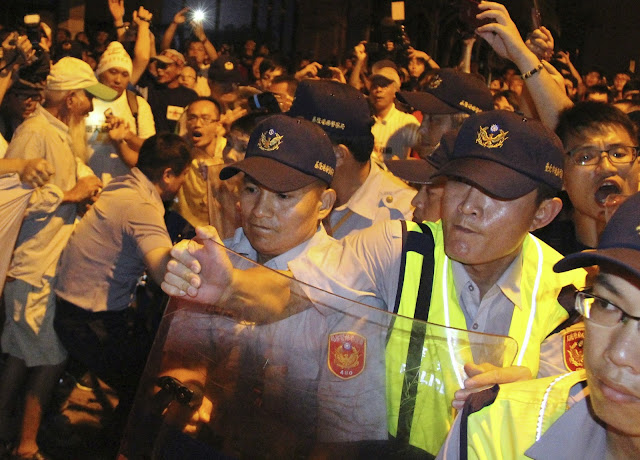On August 27th, residents of Huaguang Community and their supporters marched on the streets of Taipei to protest the eviction and forced demolition of Taipei last mainlander community.
I've written quite a few entries on the case of Huaguang Community and the plight of its residents. If the reader is interested in learning more about the controversy surrounding Huaguang Community's demolition, here are the links to my previous entries on the subject:
Chiang Bei Bei - An Unexpected Acquaintance
One day in Huaguang
Destruction delayed, Anxiety Continues
Unholy Matrimony - Huaguang Community Protest Turns Ugly
Blood and Tears from Huaguang - Protest at Ministry of Justice
On August 27th, at around 8:30am, participants of the march started to arrive at the corner to Aiguo East Road (愛國東路) and Hangzhou South Road (杭州南路). Most of the organizers have been holding an all-night vigil the night before. Students were busy setting up the registration table and handing out placards, stickers and ghost money for the event. They also set up a shrine of "Residence Justice (居住正義) for participants to mourn the loss of the right to residency.
There were two groups of marchers for the Huaguang Community. One is the usual group of participants holding placards and banners. The other group is made up of fifty volunteers, mostly students. They would carry the rubbles, doors, window frames and other furnitures from the demolition site through the streets of Taipei to demonstrate the suffering of the community residents.
As I was observing the students getting ready, a man's loud voice made me turned my head. I saw Mr. Chen standing there, carrying a photograph of his deceased mother. His voice trembling with anger and sadness, Mr. Chen told the journalists on scene the tragic story of his mother, Mrs. Cheng, who fled to Taiwan with the KMT troops, after the Nationalist Chinese Party lost the Civil War in China. Mrs. Cheng became a maid and also earned money from washing dishes. She was able to purchase a small house in the community and had been residing in her house for the past five decades.
 |
| Mr. Chen with photo of his deceased mother |
The sun was scorching. The fifty volunteers, carrying heavy articles on their backs, marched slowly on the streets of Taipei, capturing attention from everyone passing by, including Chinese tourists. When the marchers arrived in front of the Executive Yuan, there were three silent performers on scene already. One wore a suit of ghost money, one had a snail shell on her back, and the other was covered in fake blood.
The marchers made their way around the silent performers to stick ghost money on President Ma Ying-jeou, Vice President Wu Den-yih and Premier Jiang Yi-huah's photographs, then moved on to Ketagalan Boulevard.
I broke with the marchers and went back to the Huaguang Community to witness the demolition, and there were plenty. The first thing I saw when I approached the community was what's left of Chen Bei Bei (Uncle Chen)'s home. Chen Bei Bei's home was a land mark of the community, because of the beautiful plum three in front of his home. He used to make plum jello from the juice he gets from the plum. Chen Bei Bei is also known as "Uncle Plum".
I found Chen Bei Bei sitting across the small street from the rubble of his home, accompanied by a police officer, holding his door number.
 |
| Uncle Plum |
"What are you going to do now?" the young police officer asked curiously and insensitively.
"They are sending me to a community for old mainlanders soldiers outside of Taipei," Chen Bei Bei replied, "But I don't tell the people I know that I am paying rent. I tell them I am paying the mortgage to my new home, because I don't want people to know I don't have a house anymore".
"You know, life is like a journey". Chen Bei Bei continued to say, "You get to stay in one place for a while, but when the time is up, you have to leave, and I am leaving".
It was very difficult to not shed any tear when witnessing such scene.
I then moved to the Jinhua Street side of the community and heard some people arguing. It was the owner of Sun's Buns (孫記包子店) and the executioners from the court. Mr. Sun insisted that because he is still in the process of appealing his case with the Ministry of Finance, the Ministry of Justice could not demolish his store. They did anyway.
As I was taking photos of the demolition, words come that the students rushed in and took over the court yard of the Ministry of Justice. After protesting for a while and demanding someone from the MOJ to come out to speak to them and accept their plead letter, 500 police officers, including the riot police, grabbed all the students, stuffed them in the police bus and dropped them off at the Sun Yat-Sen Memorial on the other side of town.
I came home with a sense of loss, and I am still recovering from the images of demolition, crying residents and students carrying heavy furniture under the brutal sun. I don't think I'll ever be able to forget what I saw and learned in the past few months.
The students vowed to continue fighting for the community members, as most of them still have to pay the tremendous fine the government imposed on them.
The students are now having public discussions at places like the Taipei Main Station and Ximending to inform the public about the Huaguang Community and the very basic right of an individual's ability to choose where he wants to live.
 |
Uncle Plum's house before and after |


















































